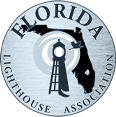Visit the Ponce Inlet Lighthouse and Museum on August 7, 2021, and help celebrate National Lighthouse Day! Tour the world-famous lighthouse museum and participate in family-oriented activities! Enjoy living history interpretations, hands-on workshops, and a special arts-and-crafts workshop for the kids. All activities are provided at no additional charge with your regular admission price from 10:30 AM to 2:30 PM.
National Lighthouse Day is an annual event that celebrates the critical role American lighthouses have played in the nation’s rich maritime history and highlights the past and present achievements of non-profit organizations like the Ponce De Leon Inlet Lighthouse Preservation Association. In addition, National Lighthouse Day helps build public support for the ongoing preservation, restoration, and dissemination of the maritime and social history of America’s lighthouses through education.
National Lighthouse Day is an annual event held on the anniversary of the signing of the 9th Act of Congress on August 7, 1789. This historic Act created the US Light-House Establishment (USLHE) to provide for the “necessary support, maintenance and repairs of all lighthouses, beacons, buoys and public piers erected, placed, or sunk before the passing of this act, at the entrance of, or within any bay, inlet, harbor, or port of the United States, for rendering the navigation thereof easy and safe.” Additionally, the Act also served to transfer all existing colonial-era lighthouses and smaller navigational aids owned and operated at the local and state level to the Federal government and commissioned the nation’s first Federal lighthouse to be constructed near the entrance to the Chesapeake Bay.
The US Light-House Establishment (later renamed the US Lighthouse Service) was given the arduous task of building the nation’s aids to navigation (ATON) system almost from the ground up. Beginning with only twelve colonial-era lighthouses in 1789, the Lighthouse Establishment oversaw the construction of more than 1,500 lighthouses and countless buoys, channel markers, and other minor navigational aids from 1880 through the early 1900s. At its peak, the Establishment was operating more than 850 active lighthouses at one time.
Although the Lighthouse Establishment erected more than 1,500 lighthouses, not all were exceptional in their design or function. Most of the towers constructed between 1789 and 1850 were short masonry or wood structures capped with a simple lantern room housing a Winslow Lewis Lighting Apparatus. Designed by a former sea captain and lighthouse builder of questionable integrity, the Lewis Apparatus was a poorly manufactured lighting system that used whale oil lamps, parabolic reflectors, and convex lenses to cast a dim light out to sea. Difficult to observe even in fair weather conditions, these early American beacons were unreliable, ineffective, and frequently criticized by the maritime community they served.
The quality of America’s aids to navigation system started to change in the 1850s when the Lighthouse Establishment was restructured and placed under the direct authority of a newly established group of maritime, engineering, and military professions known as the Lighthouse Board. The Board changed how lighthouses were constructed, equipped, and operated by:
- Incorporating the latest advancements in the fields of engineering, architecture, material manufacturing, and construction into the design, development, and building of all future towers
- Replacing the antiquated Lewis Lighting Apparatus with a far superior lighting system that consisted of a Fresnel lens coupled with a modern lamp
- Implementing a standardized set of policies and procedures for all Lighthouse Establishment personnel to follow
These efforts turned the United States Lighthouse Establishment into a highly organized and well-respected government organization that transformed America’s aids to navigation from one of the world’s worst to one of its’ best in less than a decade.
The US Lighthouse Establishment/Service continued to perform its assigned mission of maintaining and operating all lighthouses, buoys, channel markers, and public piers located in US waters for nearly 150 continuous years. However, in 1939, the decision was made to dissolve the US Lighthouse Service and transfer its assets and responsibilities to the US Coast Guard. The decision made perfect sense. The Coast Guard was created in 1915 by the merger of Lighthouse Service’s two sister agencies, the US Revenue Cutter Service and US Life-Saving Service.
Although the USCG continues to maintain the vast majority of the nation’s modern navigational aids to this day, the past 50 years have witnessed the transfer of many historic lighthouses from Coast Guard control to the state, county, or local level. In many cases, responsibility for the ongoing maintenance, operation, and preservation of these historic beacons has been assumed by private, non-profit organizations like the Ponce De Leon Inlet Lighthouse Preservation Association.
GPS and other forms of electronic navigation have made lighthouses all but obsolete in modern times. Although the lights still burn brightly at the top of many lighthouses, the primary mission of these iconic structures has shifted from one of ensuring maritime safety to one of public education. Many historic lighthouse facilities now serve as cultural sites and museums, including the Ponce De Leon Inlet Light Station.
Want to become a part of Ponce Inlet Lighthouse history? Make your mark with our memorial brick program! Memorial bricks are a great way to honor loved ones and special events, including weddings, birthdays, anniversaries, and family vacations. Best of all proceeds from your brick purchase help fund ongoing historic preservation and restoration work at the Ponce Inlet Light Station.
Ways to purchase your memorial brick:
- Order online at lighthouselocker.org/memorial-bricks/
- Order through mail: Print out and complete the memorial brick order form on our website and mail with an enclosed check.
- Purchase at any register in the museum gift shop.
The Ponce de Leon Inlet Preservation Association thanks you for you ongoing support and we hope to see you on August 7 for our annual National Lighthouse Day celebration!



